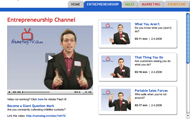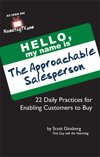 I’m tired of people telling me that there are no limits.
I’m tired of people telling me that there are no limits.
Yes, there are.
Everybody has them. And to ignore your limits is to deny your truth.
HERE’S THE REAL SECRET: Instead of running from your limits – or, worse yet, pretending they don’t exist – try leveraging them.
Leverage, as you may recall from previous posts, is, “To increasing the rate of return on an investment.”
But leverage isn’t a word. Or a strategy. Or something you do to make money.
Leverage is a lifestyle. A way of thinking. An approach to doing business.
I like to think of it as killing to two stones with one bird.
Take it from a guy with no background, no job experience and no credentials – who turned a simple idea like wearing a nametag everyday into a successful enterprise.
Twelve books later, if that’s not leverage, I don’t know what is.
Today we’re going to explore a collection of ideas to help you leverage your limitations: 1. Objectivity is equity. In the past eight years, I’ve delivered over six hundred presentations for corporations worldwide. And typically, I’m the outsider. The freak. The only person in the room who doesn’t know the inner workings of the industry.
Initially, I viewed this as threat to my credibility. A disconnect between the speaker and the audience. But then it occurred to be: People need fresh air. A new perspective from an unbiased source that has no stake in the organization. That’s when I began leveraging my outsiderness as a strength – not a limitation.
If you find yourself in a similar position, ask yourself a few questions:
*What limitations enable you to be more objective than your competitors?
*What assumptions can you explore that most people never think of or take for granted?
*What thinking patterns can you deliver as a result of your ability to detach from the outcome?
Remember: It’s a lot easier to break the limit when you don’t know the limit exists. And the less you know, the more likely you are to come up with an original idea. Are you willing to tell people you know nothing in order to change everything?
2. Magnify your unhideables. With the exception of plastic surgery and cryogenic freezing, age isn’t something you can hide. However, that can work to your advantage if you position yourself strategically.
For example, let’s say you just graduated college. And you’re the youngest person in your office by twenty years. Instead of viewing your youth a sign of immaturity and lack of experience – consider it an asset that enables you to offer a continuous flow of vitality and perspective to your organization.
If you’re proactive and powerful – without coming off as arrogant and annoying – people will notice.
Or, maybe you’re the company veteran. And you’ve been around longer than most of the interns have been alive. Instead of seeing yourself as a dusty monument of irrelevance, position yourself as a reservoir of diverse experience and wisdom who can predict forthcoming industry trends.
If you’re inspiring and visionary – but without coming off as condescending and entitled – people will notice.
Remember: A chicken ain’t nothing but a bird, and age ain’t nothing but a number. Are you focusing on the years or the mileage?
3. Limited palettes make for stronger expressions. In Alan Fletcher’s inspiring book, The Art of Looking Sideways, he explains that the first move in any creative process is to introduce constraints.
Which sounds counterintuitive, as art is an expression of freedom. But having boundaries is what forces you to tap into – and trust – your inner resources in creative ways.
What’s more, limitation is inspiration. When you use it to fuel your creative fire, it enables you to create something that surprises yourself. And that’s where genius lives.
Take the recession, for example. I don’t know about you, but the devastating economy was the best thing that ever happened to my business. Sure, profits aren’t as high the used to be. But the pendulum will swing back eventually.
Meanwhile, in light of shrinking client budgets, I’ve been forced to evolve my service line, expand my role repertoire and provide new value to accommodate my markets. Now, with multiple profit centers, my company has evolved into a more robust, more diverse and more equitable enterprise.
And as a result, my client positioning shifted into that of a resource – not just a writer. And that’s worth money. All by virtue of the economy sucking big time. How could you put yourself in a position that would force your to renew your resourcefulness?
4. Know what you aren’t. This spring, I’m releasing a series of customized, limited edition art prints for my clients. They’re extremely scarce, very expensive and highly unorthodox. But the product is worthwhile because it assures one thing: Their mission becomes more than a statement.
The problem was: I couldn’t draw a straight line if I tried. I’m an artist of the verbal – not the visual. And as much as my ego wanted me to be responsible for every part of the process, I eventually made the decision to surrender.
Thanks to the suggestion of my friend Matt, I hired out the artwork to a brilliant letterpress shop called Firecracker Press. And to my delight, their craftsmanship was a million times better than anything I could have ever attempted.
Lesson learned: It’s a beautiful moment when you realize what you can’t do. After all, sometimes that’s the only way to free yourself to focus on what’s left. Like the boxer with a broken arm, you realize you have no choice but to develop your speed. Or, in my case, pay someone to punch for you. What are you afraid to let go of?
5. Limitations are the doorways to your deepest value. In Hugh Macleod’s bestselling book Ignore Everybody, he shares a fascinating theory about circumventing limitations:
“Picasso was a terrible colorist. Saul Steinberg’s formal drafting skills were appalling. Henry Miller was a wildly uneven writer. Bob Dylan couldn’t sing or play guitar. But that didn’t stop them, right? And why should it?”
Lesson learned: Don’t be stopped by not knowing how. In fact, not knowing how might be the best thing that ever happened to you.
Think about it: If you don’t know where you’re going, nobody can stop you – not even you.
Instead of berating yourself for limited proficiency, use the absence of know-how to activate the excavation of know-why. Tap into the truest motives behind your work. How will come in time.
Until then, just start. You don’t need lessons. You don’t need a degree. And you certainly don’t need anybody’s permission. Just start. As George Carlin once said, “It’s not enough to play the right notes – you have to know why the notes need to be played.” What will sucking make available to you?
REMEMBER: Limits are a beautiful thing.
They expose value.
They galvanize focus.
They renew resourcefulness.
Learn to leverage them, and you’ll kill two stones with one bird every time.
LET ME ASK YA THIS…
Are you ignoring, avoiding or leveraging your limits?
LET ME SUGGEST THIS…
For the list called, “50 Questions Every Entrepreneur Should Ask,” send an email to me, and I’ll send you the list for free!
* * * *
Scott Ginsberg
That Guy with the Nametag
Author, Speaker, Entrepreneur, Mentor
[email protected]
 Too many ideas?
Too many ideas?
Tune in to The Entrepreneur Channel on NametagTV.com.
Watch video lessons on executing what matters.
 Sick of selling?
Sick of selling?
 Following your heart is more than just doing what you want.
Following your heart is more than just doing what you want.
 I’m tired of people telling me that there are no limits.
I’m tired of people telling me that there are no limits.
 Congratulations. You remember names. You celebrate birthdays. You memorize preferences.
Congratulations. You remember names. You celebrate birthdays. You memorize preferences. You can only nurture pointless relationships for so long.
You can only nurture pointless relationships for so long.  You’re not in the job market – you’re in opportunity market.
You’re not in the job market – you’re in opportunity market.